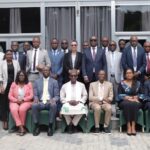UNGA 2025: Am Zainab Mohammed Call for a Just Borderless World.
By Raymond Enoch
As global leaders gather in New York for the 80th session of the United Nations General Assembly (UNGA), a powerful and urgent call has emerged from the diplomatic stage, urging for a borderless world built on justice, dignity and coexistence.
Ambassador Zainab Mohammed, a respected voice in global economic sovereignty and pan-African diplomacy, has issued this bold challenge to the international community:through a statement saying that to make this UNGA at 80, it is not just another ceremonial checkpoint, but a true turning point in the course of human history.
In a stirring message directed to the UN Secretary-General and world leaders, Mohammed urged the assembly to transcend the routine rhetoric of peace and instead commit to transformative action.
> “Let UNGA 80 be remembered not for what was said but for what was changed,” she declared.
The Ambassador’s message critiques the persistent gap between intention and action in global affairs—particularly on the issues of war, displacement, and injustice. While leaders continue to convene annually under the banner of peace and cooperation, the crises they aim to resolve remain deeply entrenched.
Mohammed’s vision is nothing short of revolutionary: a move toward a borderless world founded on justice, dignity, and human coexistence. “We must shift from discussing peace to delivering it,” she stated. “From defending borders to dismantling the walls that divide us.”
This vision comes at a time when the world faces a confluence of humanitarian, environmental, and geopolitical emergencies. Yet Mohammed’s call is not only aspirational—it is a warning. Without unified and urgent solutions, she argues, today’s unresolved challenges will become tomorrow’s legacy of failure.
> “This generation cannot afford to pass on the burden of war, poverty, and displacement to the next,” she emphasized.
Ambassador Mohammed, known for her fierce advocacy for women and girls and her strategic leadership in pan-African economic policy, concluded her statement with a clear mandate for action:
> “Let peace be our collective legacy.”
As world leaders deliberate behind closed doors, Mohammed’s message resonates far beyond the halls of the UN—reminding us that the work of building a just and unified world belongs not only to governments, but to all of humanity.
Whether or not UNGA 80 will rise to the occasion remains to be seen. But one thing is certain: the call for a borderless world has now been clearly—and powerfully—voiced.








